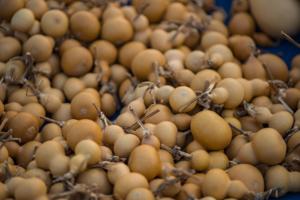What to Feed a Pot Plant
If you are keeping a pot plant or a houseplant, it is essential to feed it regularly to ensure it grows healthy and strong. Feeding a pot plant can be confusing, especially if you are new to gardening. In this article, we will go over what to feed a pot plant and answer some frequently asked questions.
What Nutrients do Plants Need?
All plants need three primary nutrients to grow: nitrogen, phosphorus, and potassium. These are often referred to as N-P-K. Nitrogen is responsible for growth and making leaves green. Phosphorus helps in root growth, while potassium strengthens the plant and helps it resist disease.
Aside from these primary nutrients, plants also need trace elements such as calcium, magnesium, and iron, among others. These micronutrients are no less important and are required in smaller quantities for the plant to thrive.
What Fertilizer is Best for Pot Plants?
When it comes to fertilizer, there are two main types to choose from: liquid and granular. Liquid fertilizers are absorbed quickly by the plant, making them ideal for a quick nutrient boost. Granular fertilizers, on the other hand, release nutrients slowly over time and are ideal for long-term use.
In terms of content, most pot plant fertilizers contain higher amounts of nitrogen than the other two nutrients. This is because nitrogen is responsible for the plant's growth and green leaves. Some fertilizers also contain trace elements, which are beneficial for the plant's overall health.
When and How to Fertilize Pot Plants
The frequency of fertilization depends on the type of fertilizer you are using. For liquid fertilizers, you can apply them every two weeks during the growing season. For granular fertilizers, apply them every two to three months.
When fertilizing a pot plant, always follow the instructions on the label. Over-fertilizing the plant can cause more harm than good and can even kill the plant. It's also essential to water the plant before and after applying the fertilizer to avoid burning the roots.
Can You Make Your Own Plant Food?
Yes, you can make your own plant food using items you may already have at home. One common option is compost tea, which is made by steeping compost in water for several days. The resulting liquid can be used as a natural plant fertilizer.
You can also make a DIY fertilizer by mixing Epsom salt, baking powder, and household ammonia in water. This DIY fertilizer contains essential nutrients for the plant, such as nitrogen, phosphorus, and magnesium. However, always research before making your own plant food as certain plants require specific nutrients.
Final Thoughts
Feeding a pot plant is vital for its growth and overall health. Be sure to choose the right fertilizer, follow the instructions on the label, and fertilize only when necessary. With the right care, your pot plant will thrive and beautify your indoor space for years to come.

 how many times do yo...
how many times do yo... how many planted tre...
how many planted tre... how many pine trees ...
how many pine trees ... how many pecan trees...
how many pecan trees... how many plants comp...
how many plants comp... how many plants can ...
how many plants can ... how many plants and ...
how many plants and ... how many pepper plan...
how many pepper plan...
































